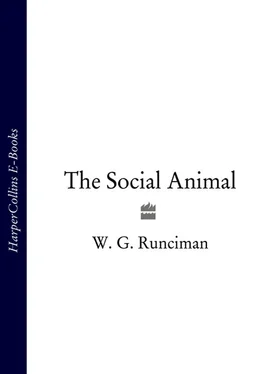Once, however, you have identified the society’s constituent roles, you may want to proceed in either of two very different directions. You may, on the one hand, want to go on to ask ‘why are these roles as they are?’ (a question which itself, as we shall see in a moment, can be interpreted in several different ways). Or you may, on the other hand, want to ask ‘what is it like to be one of the people occupying and performing one of these roles?’ This second question, obviously, is one which doesn’t arise at all in physics or chemistry. Not that it only arises in the study of the behaviour of human beings: some of the most remarkable recent research into the social behaviour of primates is directed precisely to establishing how far they do or don’t attribute to each other minds like their own. 13 But this book is about the social behaviour of humans, and therefore organisms with minds which have the inborn capacity for all the richness and subtlety of language as spoken only by us. And it is this which gives the question ‘what is it like to be a whatever-you-are?’ not only its perennial interest but also its peculiar difficulties.
Unconvinced readers, fresh perhaps from ‘postmodernist’ texts, may protest that since I have already conceded the difficulty of establishing beyond argument what somebody else is ‘really’ thinking, I am hardly entitled to claim that even the most experienced sociologist can ever test an account of what is going on inside other people’s heads in the way that an explanatory hypothesis about the externally visible influences on other people’s externally visible behaviour can be tested if the requisite evidence is there. But there are two answers to this. First, the way to test a description of someone else’s subjective experience is to try it out on that person; unless that person is deliberately seeking to mislead, as one or more of those teenage Samoan girls appear to have deliberately deceived the gullible Margaret Mead, the observer’s description can be progressively expanded and refined to accord with what the person is willing to confirm as authentic. Second, in explanation just as much as in description, there comes a point at which, to borrow a metaphor from Wittgenstein, the spade is turned; children quickly discover that if they respond to every answer to a question ‘why?’ with another ‘why?’, the adult interlocutor is soon helpless. No sociologist – or psychologist – claims to be able literally to recreate the mental state of one person inside the mind of another. No heterosexual lover who has ever interrogated a partner about exactly what it feels like at the moment of orgasm will need to be told that empathy has a limit. But it would be absurd to conclude that different people can convey nothing to each other about the nature of their different subjective experiences. Indeed, it is sometimes the very incommensurability of subjective experience which can be deployed to good rhetorical effect. If a friend who has recently been bereaved says to you, ‘My sense of desolation was more all-consumingly painful than you can possibly imagine’, this may help you to understand the experience – understand it, that is, in the empathic, descriptive sense – better than any other words your friend might have chosen instead.
But however conducted, the exercise is a quite different one from the formulation of an explanatory hypothesis with which to account for the behaviour in question. It not only employs different techniques, but appeals to different standards, is open to different criticisms, and follows different rules. What’s more, the description of a pattern of social behaviour as experienced by those whose behaviour it is may be not only at variance from, but in flat contradiction with, the hypothesis which turns out to explain it correctly. Nor is there anything to be surprised at in this, since, as any psychologist will tell you, all of us are likely to be mistaken about the causes of our own behaviour. Not totally, perhaps, and not always. But often enough for the disjunction between why we do what we do and what it is like for us to do it to be as important a feature of our social lives as any of the large-scale crises and upheavals for which sociologists studying our behaviour may be lying in wait at the institutional or societal level.
Descriptions of subjective experience, particularly at the cultural level, have traditionally been the domain of anthropologists rather than sociologists. But the division of labour between the two is largely conventional. Anthropologists tend to study alien cultures by living in them for a year or two and then reporting to their uninitiated compatriots on the curious habits and customs of the Azande, !Kung San, Eskimos, Hopi Indians, or whoever it may be. Nothing prevents them from doing the same back home. You can do fieldwork in Totnes as well as Tahiti. But as the range of such studies has broadened and their methods been refined, so has there increased the volume of debate on the same dilemma as arises from the travels of Herodotus or the arrival in Hawaii of Captain Cook. ‘They’ see the world very differently from the way in which ‘we’ do, and believe very different things about it. So what are the right terms for ‘us’ to use in describing ‘them’? Ours or theirs?
If the question is put that way, the answer has to be ‘theirs’. But it’s a mistake to put it that way. It’s true that anyone studying a society remote in either place or time from their own is likely to have to grasp ideas and beliefs very different from the culture in which they themselves were reared. But the measure of their success is precisely their ability to translate them back, as Evans-Pritchard and many other anthropologists have done, into terms comprehensible to ‘us’; and the fact that it can be done is a conclusive demonstration that ‘we’ and ‘they’ are both variants of that same universal human nature acknowledged by Herodotus within which we and they are neither more nor less peculiar than each other. When, therefore, the American anthropologist Clifford Geertz enjoins his fellow-anthropologists in a much-quoted article to ‘hawk the anomalous’ and ‘peddle the strange’, 14 he is denying the very presupposition which legitimates his own professional practice. Who’s more exotic, Professor? You or them? What makes those Balinese cockfights you’re telling us about 15 any more anomalous or strange than those baseball games at the Yankee Stadium? And while you’re about it, perhaps you can help us to understand an anomalous society like yours in which the topmost political role can be occupied by a former Grade B movie actor of limited intelligence called ‘Ron’ whose schedule is arranged for him by his wife under the guidance of an astrologer, and a strange culture like yours whose inherited complex of myths and symbols includes a pervasive totemic cult of an anthropomorphized duck called ‘Donald’ and an anthropomorphized mouse called ‘Mickey’.
Geertz’s article is called ‘Anti-anti-relativism’ because his perfectly legitimate concern is to emphasize how very different from one another different cultures and societies are. But the title is a pity all the same since relativism is a problem in philosophy – or, more strictly, in epistemology – rather than anthropology and sociology. The reason is simple. Any practising anthropologist or sociologist who takes epistemological relativism seriously has no option but to quit work. It’s one thing to recognize that ‘our’ beliefs and values are not inherently privileged over ‘theirs’, but quite another to conclude that ‘we’ can therefore never make meaningful judgements of any kind about ‘them’. What’s the point of going out to do fieldwork among either the Balinese or the North Americans if all you’re going to be able to come back with is an arbitrary description in untranslatable terms of their unreachable ideas about their illusory culture? If there is any pay-off from ‘anti-anti-relativism’, it is that it re-emphasizes the precept that since the results of anthropological, as of any other, research are a function not only of the evidence but of the assumptions with which the researcher approaches it, you had better be careful not to take your assumptions for granted. The dictum that ‘the point of view creates the object’ – which it does in natural and social science alike – may not have much immediate impact on the research of, say, a demographer who just wants to know by how much the Chinese birth-rate is going up or down or a political scientist who just wants to know how many female American voters have voted for one presidential candidate rather than another. It’s obviously more relevant where the research is of the kind which can be vitiated by the unexamined assumptions of observers like those white men who didn’t think to ask the Ashanti about the role of their Queen Mother. But to point that out is not to undermine the status of anthropology as a serious academic discipline. On the contrary: it’s all part of encouraging the next generation of anthropologists to get the cultures they choose to study more nearly right.
Читать дальше




![О Генри - Социальный треугольник [The Social Triangle]](/books/405340/o-genri-socialnyj-treugolnik-the-social-triangl-thumb.webp)







